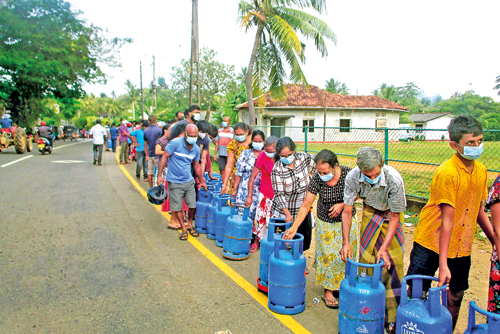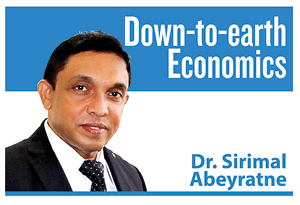Satan in guardian angel clothing
View(s):
File picture of a queue for cooking gas.
I am not surprised about today’s economic crisis in Sri Lanka, but I am very sad about it. This could have been avoided. I am sad about it, because we had enough time to make corrections and change directions to avoid it; but we didn’t, as our priorities were different.
Learning from crises
There is something I have learnt about economic crises: “Crises build up slowly, but the collapse is instant”. I started learning about the crises since the time of the US financial crisis in 2008. Amazingly, I learnt about “it’s coming” even before it happened! As it inspired me to learn more about economic crises, I gathered information about crisis-ridden countries too – particularly Greece, Venezuela and Lebanon – the countries that faced severe economic crises during the past 10 years.
The fate of Greece was, however, turned around with harsh economic policies and with the support of its saviours – the European Union countries, the European Central Bank and the International Monetary Fund; they came forward to inject funds preventing it from collapsing and defaulting its debt. But even after 10 years, Greece still hasn’t returned to normalcy although it seems to be now free from bankruptcy.
Venezuela and Lebanon are still sinking in their economic crises. It is quite strange for Venezuela which is a rich country and a country with proven large oil deposits in the world. It is wrong economics to think that having resources such as oil deposits is the road to prosperity; it is because resources can be a curse rather than a blessing of a nation!
From Venezuela, it was clear that economic crises can trigger political crises, social crises and humanitarian crises. At the early stages of crises, there’s going to be supply shortages of essentials, rapid increase in prices and fast depreciating exchange rates. Then it develops into other forms of crises; political and social unrests; mass-scale poverty-led crimes, robberies and looting; millions of people leaving the country. Venezuela has been experiencing all that.
 Interestingly, Lebanon is a country that has lots of parallels with Sri Lanka. Historically, as Sri Lanka was known to be one of the prosperous countries in Asia, Lebanon too was among the most prosperous countries in its region for which it has even earned a nickname – “Switzerland in the Middle East”. Then, Sri Lanka was caught up in a 30-year conflict and so was Lebanon which also faced a 30-year conflict. Once the conflict was over, tourism and worker remittances brought foreign exchange in both countries, which were caught up in heavy borrowings; then the crisis!
Interestingly, Lebanon is a country that has lots of parallels with Sri Lanka. Historically, as Sri Lanka was known to be one of the prosperous countries in Asia, Lebanon too was among the most prosperous countries in its region for which it has even earned a nickname – “Switzerland in the Middle East”. Then, Sri Lanka was caught up in a 30-year conflict and so was Lebanon which also faced a 30-year conflict. Once the conflict was over, tourism and worker remittances brought foreign exchange in both countries, which were caught up in heavy borrowings; then the crisis!
By the way, in 2020 Lebanon had a massive explosion for which the political authorities and the top-ranked bureaucrats were charged for negligence. The Sri Lankan analogous was that here too there was a terrorist attack which resulted in similar protests blaming the authorities and demanding justice.
Diverse clarifications
After all, Sri Lanka was also caught up in an unprecedented economic crisis being the first country in Asia to collapse in the midst of the COVID-19 issue. We isolate the issues according to our own preferences, as the “cause of the crisis”. Some would try to interpret it as a result of the pandemic, while some others would see it as a result of tax cuts in 2019 or the fertiliser ban in 2020.
It is quite common to see the problem as a result of bribery and corruption as well as robbing public money by the politicians. Educated youth whose aspirations were demolished and the future lost in the crisis would like to see it more as a result of these problems. Some would like to place heavy emphasis on borrowings as well as, uneconomical ways of using borrowed money, including corrupt practices connected with borrowed money.
At the same time, some analysts would like to see the problem related to seven decades of economic journey after Independence in 1948. According to another analysis, the current economic crisis is a problem of the post-1977 free-market problem or a neo-liberal problem, thinking that the Sri Lankan policy regime after 1977 was a free-market economy or a neo-liberal economy.
I am not, however, denying the importance of all sensible and relevant explanations; they all have played a role here. If we can attribute the crisis into any or more of the above factors, we can still recognise one important thing missing in these analyses – the role of the public organised under various political groups, lobbying groups and interest groups. In that sense, we may appear as guardian angels in the midst of the crisis time, but if we look back on our behaviour, we have also played the role of Satan in contributing to the crisis!
Ultimate problem
Let me explain it, though it looks like a controversial statement. Before that, however, I must elaborate what accounts for the ultimate cause of the crisis. If we go deeper analysing the source of crisis, we end up with the problem of “spending beyond capacity” as a nation.
The problem of “spending beyond capacity” has two sides, while it can be seen through two accounts. The two sides are the spending side and the capacity side; this means that increased spending or shrinking capacity or both would be a cause of the problem. The two accounts are the internal finance (government budget) and the external finance (balance of payments). In either account, when there is over-spending beyond capacity, it directly results in borrowings – both domestic borrowings and foreign borrowings, causing debt accumulation.
I have already said that, crises build slowly, and collapse instantly. Crises build slowly when a nation continues to carry out over-spending beyond capacity in the case of either internal finance or the external finance. Have we, as members of the public, ever contributed to build this crisis over the years, influencing either increased-spending or declined capacity?
This is a valid question for all of us. We are not individuals in the society; we are part of the influential groupings in the society – political parties, trade unions, student unions, professional associations, business associations, or any interest group related to formal or informal occupational activity.
Our role in the crisis
There is no question that we all have played a major role in shaping our spending beyond capacity. Let me elaborate a few things as I can recall. We wanted the government to spend for us beyond the capacity; some of us, of course, robbed public money in the form of misusing public services and resources for our own benefit. At the same time, we love to hide our wealth and income to avoid taxes, which has caused decreased capacity.
In the case of external finance, we were the obstacle to investment and businesses that would have otherwise generated foreign exchange improving the capacity; we have even caused the governments to close down some of the businesses which would have become foreign exchange earners and tax-paying businesses. We never protested against foreign borrowings, but we did protest against foreign investment and investors.
If it is the politicians and the governments that have brought up the crisis, they also did that together with the public. After the crisis is built up over the years, it requires a trigger for the collapse – an external shock. In our case, this triggering factor was the pandemic, followed by the chaotic global markets.
The way out of the crisis is also through the way in; we need to address its fundamental problem of spending beyond capacity. It is a painful journey as we need to walk through cutting down spending and improving capacity with respect to both internal finance and external finance.
(The writer is a Professor of Economics at the University of Colombo and can be reached at sirimal@econ.cmb.ac.lk and follow on Twitter @SirimalAshoka).
Hitad.lk has you covered with quality used or brand new cars for sale that are budget friendly yet reliable! Now is the time to sell your old ride for something more attractive to today's modern automotive market demands. Browse through our selection of affordable options now on Hitad.lk before deciding on what will work best for you!


